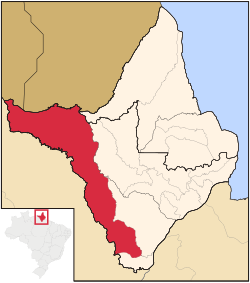Laranjal do Jari
Laranjal do Jari | |
|---|---|
Municipality | |
| The Municipality of Laranjal do Jari | |
 | |
| Nickname(s): "Beiradão" (Big Edge, because of the city's large boundary and its location in the edge of Amapá.) | |
| Motto: "Laranjal com Responsabilidade" (Laranjal with Responsibility) | |
 Location of Laranjal do Jari in the State of Amapá | |
| Coordinates: 00°51′20″S 52°32′21″W / 0.85556°S 52.53917°W | |
| Country | |
| Region | North |
| State | |
| Founded | 17 December 1987 |
| Government | |
| • Mayor | Márcio Serrão (PRB) |
| Area | |
• Total | 30,783 km2 (11,885 sq mi) |
| Elevation | 7 m (22 ft) |
| Population (2020)[1] | |
• Total | 51,362 |
| • Density | 1.7/km2 (4.3/sq mi) |
| Time zone | UTC−3 (BRT) |
| HDI (2000) | 0.732 – medium[2] |
| Website | laranjaldojari.ap.gov.br |
Laranjal do Jari (Template:IPA-pt) (Jari Orangery) is a municipality located in the west of the state of Amapá in Brazil. It is the only municipality in the west boundaries of Amapá, except for a small part of Vitória do Jari. Its population is 35,114 and its area is 30,783 km², which makes it the largest municipality of Amapá.[1]
History
The land was originally inhabited by Amerindians. Later businessmen set up rubber plantations. The largest plantation was owned by José Júlio de Andrade who owned 35,000 square kilometres (14,000 sq mi) of land which made him the biggest landowner at the time. In 1948, his tenants revolted and he was forced to sell the land to Portuguese businessmen who sold it to Daniel K. Ludwig, an American billionaire,[3] in 1964.[4]

In 1967, Ludwig conceived the Jari project. He wanted to replace the rainforest with Gmelina arborea for the pulp industry.[3] A planned city called Monte Dourado was built in Almeirim, however it was unable to provide housing for all the workers, and a shanty town called Beiradão emerged on the other side of the Jari River.[5] The project turned into a major money losing failure, and in 1982, he sold the land.[6]
In 1987, the land became an independent municipality, and Beiradão was renamed Laranjal do Jari.[3] The city is still mainly a river slum, and suffers from fires, floods, and open sewage.[7]
Transport
Laranjal do Jari is connected to the BR-156 and BR-210 highways.[8] The city of Monte Dourado can be reached by ferry.[9]
Nature
The municipality contains 39% of the 501,771 hectares (1,239,900 acres) Rio Cajari Extractive Reserve, created in 1990.[10] It also contains 69% of the 806,184 hectares (1,992,120 acres) Rio Iratapuru Sustainable Development Reserve, created in 1997.[11] A part of the Tumucumaque Mountains National Park is located within the municipality.[12]
Indigenous peoples
The Wayampi Indigenous Territory is located in the municipality and is home to the Wayampi and Aparai people.[13] The area inside Laranjal do Jari measures 3,592 square kilometres (1,387 sq mi).[14] A group of Wayampi have settled along the Amapari and Anakui Rivers, however information about the group is very limited.[13]
Villages
References
- ^ a b c IBGE 2020
- ^ [1] Archived 2009-10-03 at the Wayback Machine UNDP
- ^ a b c "Laranjal do Jari" (PDF). IBGE via WebCitation (in Portuguese). Archived from the original (PDF) on 3 March 2016. Retrieved 1 April 2021.
- ^ "End of U.S. owner's dream in the Amazon jungle". UPI Archives. Retrieved 2 April 2021.
- ^ "The Jari Project of Brazil". San José State University. Retrieved 2 April 2021.
- ^ "Daniel Ludwig, Billionaire Businessman, Dies at 95". New York Times. Retrieved 1 April 2021.
- ^ Eliana do Socorro de Brito Paixão (2013). "A realidade socioambiental de Laranjal do Jari/AP: soluções apontadas por moradores na perspectiva da educação popular" (in Portuguese and English). Editora da Universidade Federal de Uberlandia.
- ^ "Governo do Amapá inicia pavimentação do trecho sul da BR-156". Government of Amapá (in Portuguese). Retrieved 2 April 2021.
- ^ "Balsa que faz travessia de laranjal do Jari para Monte Dourado está quebrada, no AP". Globo (in Portuguese). Retrieved 2 April 2021.
- ^ RESEX do Rio Cajari (in Portuguese), ISA: Instituto Socioambiental, retrieved 6 November 2016
- ^ RDS do Rio Iratapuru (in Portuguese), ISA: Instituto Socioambiental, retrieved 5 November 2016
- ^ "Tumucumaque Mountains Park". Visite O Brasil. Retrieved 1 April 2021.
- ^ a b "Wajãpi". Socio Ambiental. Retrieved 1 April 2021.
- ^ "Terra Indígena Waiãpi". Terras Indigenas. Retrieved 1 April 2021.
External links
- Official website (in Portuguese)
 Media related to Laranjal do Jari at Wikimedia Commons
Media related to Laranjal do Jari at Wikimedia Commons



